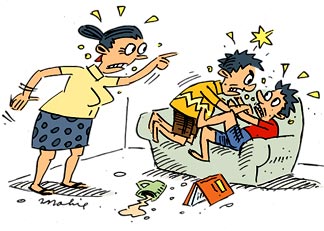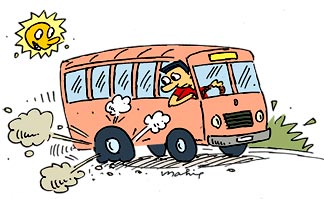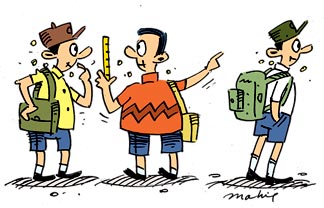
by R. S. Karunaratne
Grammar patterns involving 'Stop'
 'Stop'
is a regular verb (Stop, stopped, stopped) and a noun denoting the place
of stopping. 'Stop'
is a regular verb (Stop, stopped, stopped) and a noun denoting the place
of stopping.
1. 'Stop' is used to talk about an activity ending or pausing.
The train just stopped; passengers are getting off.
Let's Stop playing and have refreshments.
You must Stop writing at 12.30 p.m.
When are you going to Stop working?
Stop quarrelling!
2. 'Stop' is used to talk about causing something or somebody not to
move.
Stop that man. He's running away with my purse.
A policeman stopped me and asked for my National Identity Card.
A stranger stopped me and asked for a small donation.
We cannot Stop rain or wind.
Why did you Stop me, officer?
3. 'Stop' is used to talk about not doing something any more.
I felt relieved when he stopped scolding me.
The patient's condition worsened when he stopped taking medicine.
Stop smoking, it's bad for your health.
Students stopped shouting when the teacher entered the classroom.
4. 'Stop' is used to talk about preventing somebody or something from
doing something.
Do you know how to Stop this engine?
Stop talking and listen to the teacher.
The policeman stopped the woman from jumping into the river.
When he wants to do something, nobody can Stop him.
5. 'Stop' is used to talk about pausing one activity in order to do
something else.
We stopped at Belihuloya for lunch.
Let's Stop here to admire the scenery.
If you wish to be fluent in speech, do not Stop to think about
grammatical rules.
6. 'Stop' is used along with certain adverbials.
The train stopped abruptly.
We heard somebody screaming, and we stopped dead in our tracks.
I heard my name being called over the public address system and
stopped short.
When the policeman blew his whistle, he stopped his car immediately.
The bus stopped suddenly when a tyre
burst.
 7.
'Stop' is used in phrasal verbs. 7.
'Stop' is used in phrasal verbs.
He stopped by to have a chat with me.
(visited briefly)
On my way home I stopped over at the supermarket. (broke the journey)
8. 'A Stop' is a phrase used to talk about a complete halt.
Although the bus was driven at a high speed, the driver managed to
bring it to a Stop when a calf crossed the road.
The government must put a Stop to ragging.
9. Set phrases
Stop it! You're damaging the furniture.
He stopped at nothing to get himself elected to parliament. (He did
everything possible.)
[Electric words]
Learning more and more words will enrich your vocabulary. In the long
run, you will be a better writer and a speaker. Here are ten sentences
with unfamiliar words. Tick off (a), (b) or (c) and check your answers
with the key.
1. Every vehicle should have a tank for storing fuel.
(a) container
(b) garage
(c) driver
2. There was a shortage of food after the tsunami.
(a) surplus
(b) lack
(c) supply
3. The philanthropist set up a fund that will provide for perpetual
care of the hospital.
(a) eventual
(b) necessary
(c) continual
4. Keep my personal papers in the steel cabinet.
(a) private
(b) public
(c) useless
5. Maintain your composure when addressing a meeting.
(a) position
(b) calmness
(c) attitude
6. My sister despises getting up early in the morning.
(a) loves
(b) likes
(c) detests
7. Hitler was a heartless leader who persecuted the Jews.
(a) polished
(b) cruel
(c) disciplined
8. All of us look forward to a serene old age.
(a) tranquil
(b) boring
(c) anxious
9. The shrill tone of the train whistle disturbs many people.
(a) movement
(b) sound
(c) use
10. All the glass windows of the old building have become opaque.
(a) valuable
(b) worthless
(c) non-transparent
***********
Key
1 (a), 2 (b), 3. (c), 4 (a), 5 (b), 6 (c), 7. (b), 8 (a), 9 (b), 10
(c)
***********
Starters
Possessive adjectives and possessive pronouns
 Possessive adjectives and possessive pronouns are used to show
ownership or relationship. A possessive adjective is used along with a
noun. A possessive pronoun replaces a possessive adjective and its noun. Possessive adjectives and possessive pronouns are used to show
ownership or relationship. A possessive adjective is used along with a
noun. A possessive pronoun replaces a possessive adjective and its noun.
1. Possessive adjectives
This is my pen.
These are our books.
This is your pencil.
This is his ruler.
This is her dictionary.
This is its cage.
These are their bags.
2. Possessive pronouns
When a possessive pronoun is used we do not repeat the noun.
Your car looks like mine.
This bat is his.
The doll is hers.
This plate is yours.
Our cricket team is stronger than theirs.
3. 'Its' and 'It's' are two confusing words.
'Its' is a possessive adjective.
The dog is sleeping in its kennel.
'It's' is the contraction (short form) of "it is"
I like tea. It's my favourite drink. |

